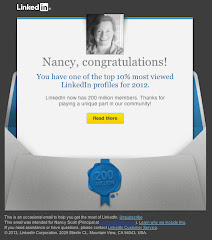Mark W. Schaefer has been blogging daily (and well) for months, maybe years (when did you start, Mark?). Last week he tweeted a query to his now 9,200-and-growing followers:
“Thinking about living the life less posted. Good? Bad? Inevitable?”
I don’t know what’s driving Mark’s thought to cut back, but I know I recognized and acted upon a similar urge to battle TechFatigue. It's coming at us from so many directions now.
• Take a look at Phone Scoop’s myriad cell phone options posted within the past three days! Only technology journalists and bloggers appear vaccinated against the catatonia-inducing choices, options, and changes that comprise mobile fatigue. Add the noise from carriers -- Sprint, AT&T, t-Mobile, and Verizon -- and the invasion just quadrupled. (Are we tired yet?)
• How about macro to nano computing devices-- the desktops, laptops, netbooks, i-pads, minis, and micro-mobiles? Does all this jiggery pokery make you want to hang on stubbornly to your old computer, gosh darnnit!
• Speaking of computers, had any confusion about software choices or system upgrades lately? How about all those viewing choices inherent in Direct TV, Dish, or Fios vs. Comcast (okay, sorry, no choice there, but still…). Have you figured out Justin TV or Hulu? (Say, what? Okay, I feel an anxiety attack coming on …).
• How about storage devices and computer back-up systems .. or viruses and phishing scams, crashing hard drives, computer theft, home security systems, cars that don’t have keys, self-checkout at Giant. Even some gasoline pumps scare the fumes outta me.
All of this -- and gigabillions of bytes more -- adds up TechFatigue and leads to 21st century complaints like exhaustion, stress, sleeplessness, irritability, and illness. Heck, we know technology lies at the root of car accidents (25% of accidents, according to this source) and that it's blamed for obesity. But technology is so ... beguiling. It's so addictive.
Last fall, neuro-biologist Susan Greenfield delivered a speech in which she said, “…We might be entering a world that is more sensory than what we would traditionally call cognitive. …I'm just thinking about young brains exposed to different experiences. And it could be that the multimedia -- the sounds and the colours and experience -- is so great that that becomes the premium - 'yuck!' and 'wow!' - 'yuck!' and 'wow!'
Dr. Peter Kahn, a developmental psychologist, worries that the substitution of screen for green robs us of the healing qualities of nature itself. "People might think that if technological 'nature' is partly good, that that's good enough, but it's not. Because, across generations, what will happen is that the good enough will become the good. If we don't change course, it will impoverish us as a species...We are a technological species, but we also need a deep connection with nature in our lives."
Back in the late nineties, articles like this about technology and workplace stress abounded, as did reports of technology attacks on the home front. Curiously, though, for this decade, Google turns up fewer alerts to the threat of technology. If these effects were true a decade ago, shouldn't our psyches today be in tatter? Oh... right.. we have exhaustion, stress, sleeplessness, irritability, and illness.
Sometimes it seems we simply gave up and gave in to the "inevitable" takeover. But maybe we haven't. I’m sensing the backlash lately and noticing that some thought leaders are cooling their own obsession. Examples?
Guy Kawasaki said on March 12 that, for him, blogging is now "an asynchronous, interruption-driven activity."
In a March 3 interview with David Armano, even the frenetic, energetic, kinetic (and, admittedly, loveable) Chris Brogan acknowledged that he's a bit tired. "I'm having a really tough time scaling," he said, citing the sources of TechFatigue. "I get several hundred (over 600) emails a day, plus maybe 50 daily contact form requests, plus about 200 DMs, plus several hundred @ messages, plus 50-100 comments a day. It's getting to be hairy."
Chris also thinks "social media will flash and then simmer. It's at the brightest part of the flash right now. I'm watching the curve drop." I agree. The temperature of SocialMedia Pox is down, as I noted in this blog last week.
Our willingness to back off the frenzy gives hope -- and direction -- to battling TechFatique. Popular strategies include dumping email wholesale; auto-filing and later scanning ezines and blogs once every 10 days; visiting Twitter purposefully but not obsessively; unfriending Facebook "friends" by the hundreds, until only family and real friends remain; using the cell phone more for talking and less for email; and – just maybe and inevitably – blogging when events compel commentary.
What do you think?
-- scrubbed by Marketing Brillo
